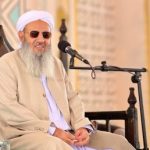 Thirty years later, memories of the three-day massacre of Palestinian refugees in Sabra and Shatila refugee camps, Lebanon, are still crystal clear.
Thirty years later, memories of the three-day massacre of Palestinian refugees in Sabra and Shatila refugee camps, Lebanon, are still crystal clear.
The United Nations General Assembly condemned the massacre and declared it to be an act of genocide.
While international sources estimate that the number of casualties of the Sabra and Shatila massacre at about 800, Palestinian sources say more than 3,500 people were brutally killed.
The massacre came on the heels of the assassination of Bashir Gemayel, leader of the Phalangists (Lebanese Christian militia). The Phalangists wrongly assumed that the Palestinians had carried out the killing and coordinated an attack on the camps with members of the Israeli Defense Force.
Zahra al-Hassan, a fiercely strong Palestinian woman known as Um Shawqi, lived in a house in Bir Hassan, an area of Beirut located a few kilometers from Sabra and Shatila.
As the Lebanese forces stormed the houses in the vicinity, she told her husband to stay calm as they didn’t possess any weapons.
The soldiers rounded her family up, forcing them to climb into the back of a pickup truck. Upon reaching Rahib, the first stop in Shatila, the men were separated from the women.
That Saturday, with no word from her husband or the remaining living members of her family, Um Shawqi searched amongst the corpses lying in the streets. Lamenting that she never found her husband she said:
“I will tell my children, and children of my children to take revenge over their father’s death and the people who were killed.”
Ever hopeful that the conflict will cease, Um Shawqi is fiercely patriotic:
“We will never forget our homeland, we are guests in Lebanon and we want to return home. We want to pray in Jerusalem with the rest of the Arabs and Christians. We are not terrorists, and it is our land that we are fighting for, we have strong young men that can eat the snake’s head,” she said.
Often described as a massacre of Palestinians, Um Shawqi was quick to dispel this rumor, mentioning the death of Syrian and Lebanese neighbors. She highlights a Lebanese family from al-Mukdad who lost 28 family members in the mass slaughter.
Siham Balqees, a Palestinian woman who lived close to the camps at the time of the massacre, described the growing horror as a lucky few escaped the camps and news of the massacre spread.
“We couldn’t believe that people were using knives on others,” she said in an interview with Al Arabiya English.
Describing some of the horrific scenes, she said:
“I saw an old lady; her mouth slit from ear to ear, because she was singing to Abu Aammar [Yassar Arafat]. I saw the body of a child, less than a month old, plastered on the side of an armored vehicle.”
Anguish rising in her voice, she recalled the bodies lying on the ground, riddled with bullet holes and slashed with machetes.
Sana Sirsawi was born in the Palestinian refugee camp Shatila, and was 19-years-old when Israeli and Phalange forces marched on the camps.
In the early stages of pregnancy, with her two young daughters, Sana Sirsawi recalled being forced to walk from Shatila to Sabra.
“All night long we heard gunfire. For three days we heard the crunching sound of light bombs as they hit the ground.”
Widespread reports and witness statements that have trickled through in the years after the massacre suggest that the Israeli Defense Force used cluster munitions. The bombs release many small bomblets over a wide area and are prone to indiscriminate effects.
Sana Sirsawi’s interview emphasized just how fresh the memory of the atrocity is in survivors’ minds; to this day she doesn’t know what happened to her husband and brother-in-law:
“We had to go through ordeals; we raised our children with all that had happened…and because of what I have seen, now I have cancer.”
Three decades later, Sept. 18 remains a day of great sadness for the Palestinian, Lebanese and Syrian families who lost so many people in the refugee camps.
By Natasha Baker
Source: Al Arabiya.com










Comments